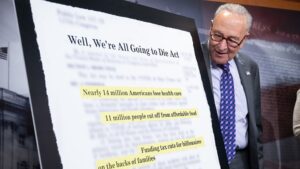Understanding the Potential Impact of the House Tax and Spending Bill on Health Insurance Coverage
As we navigate the ever-changing landscape of American healthcare, it’s vital to stay informed about proposed legislation that could significantly affect millions. The recent House tax and spending bill, often dubbed the "One Big Beautiful Bill Act," aims to reshape health coverage in the U.S., but not without a price. At Extreme Investor Network, we believe understanding the nuances and implications of such changes is crucial for making informed decisions that can impact your financial and personal well-being.
The Dramatic Shift in Coverage
According to the Congressional Budget Office (CBO), an estimated 11 million Americans could lose health coverage under this bill, which includes substantial cuts to Medicaid and the Affordable Care Act (ACA). The cuts, projected to exceed $900 billion over a decade, will stretch state budgets, increase healthcare costs, and restrict access to care, leaving legacy healthcare programs in jeopardy.
What is the One Big Beautiful Bill Act?
The bill is primarily designed to enable nearly $4 trillion in tax cuts, funneling funds away from essential health programs. It puts hundreds of thousands of Americans at risk as new work requirements are mandated for Medicaid, requiring individuals aged 19-64 to prove employment or participation in qualifying activities for at least 80 hours per month. Those unable to comply could be stripped of their Medicaid benefits, leading to increased uninsured rates across various demographics.
A Closer Look at Medicaid Cuts
Who Will Be Affected?
Experts warn that no demographic is exempt from the proposed cuts. The legislation will significantly alter how Medicaid operates, introducing stringent eligibility requirements that deny coverage to certain groups, including legal immigrants. These new policies are expected to create obstacles that may discourage already vulnerable populations from obtaining healthcare.
The Work Requirement Trap
While House Speaker Mike Johnson claims that only those who choose to will lose coverage, the reality is complex. The CBO estimates that 5.2 million adults will lose Medicaid, pushing 4.8 million into the ranks of the uninsured. Additionally, issues like paperwork mistakes can leave many eligible individuals without coverage due to bureaucratic hurdles.
The Rising Challenges States Will Face
States may soon confront severe funding challenges. The House proposal prohibits the use of healthcare provider taxes—which many states depend on to fund Medicaid. As funding diminishes, states will either have to cut vital services or divert resources from other essential state programs, leading to a ripple effect that could strain healthcare availability.
Additionally, the legislation delays the implementation of crucial Biden-era rules meant to simplify Medicaid enrollment, further complicating access for the populations that depend on it.
ACA at Risk: The Ripple Effects of Coverage Changes
With the potential for 24 million Americans relying on ACA marketplaces, cuts will reverberate through the healthcare system. Many of these changes, while financial in nature, can create a cascade of consequences that affect jobs, businesses, and household financial health.
Unpacking ACA Subsidy Expiration
The expiration of enhanced premium tax credits, designed to aid low- and middle-income families, could result in premium increases averaging $2,400 per year for families with income around $65,000. If the enhanced subsidies lapse, projections indicate that as many as 4.2 million people could be left uninsured by 2034.
Increased Administrative Burdens and Access Issues
Beyond monetary concerns, the House bill introduces a range of administrative barriers. New eligibility verification processes may add significant red tape, making it harder for people to maintain their coverage. The bill requires individuals to confirm their eligibility details annually, which could discourage enrollment—akin to navigating a labyrinth for basic healthcare access.
The Detrimental Impact on Immigrants
The bill also takes a harsh stance on specific immigrant groups, making many individuals ineligible for ACA coverage starting in 2027. This includes those currently benefiting from the Deferred Action for Childhood Arrivals (DACA) program, making future health access even more complicated for this vulnerable population.
Final Thoughts: What This Means for Your Finances
The implications of the House tax and spending bill extend far beyond healthcare; they could significantly influence your financial landscape as rising medical costs and potential loss of coverage loom large. Advocates argue that cutting essential health programs not only harms individuals but also creates long-term economic consequences that ripple across families, communities, and even the national budget.
At Extreme Investor Network, we remain committed to providing insights that empower you to navigate these changes effectively. Understanding how such legislation impacts not only your healthcare options but also your financial health is crucial in this complex landscape. Stay informed, advocate for your needs, and make decisions that align with your financial goals and well-being.

